- Home
- Richard F. Weyand
EMPIRE: Intervention (EMPIRE SERIES Book 13) Page 2
EMPIRE: Intervention (EMPIRE SERIES Book 13) Read online
Page 2
“Well, Imperial control is one thing, pushing back on tyranny is another. I think we should look for an opening.”
“I won’t violate the charters I granted them, Amanda. The Throne can’t be involved in determining outcomes.”
“I wonder if there isn’t some other opportunity to affect what’s going on. Do you mind if I look into it?”
“No, but keep in mind my restrictions. They apply to me and the whole government. And that includes you.”
Dunham caught her eye and held it, then relented a bit.
“In any official capacity, at least.”
Amanda’s Play
Gerry Conner was puttering lunch in his lakefront home when he got the meeting request. It came under an Imperial header, but it was not from the Emperor. It was a request for a meeting from the Empress Consort Amanda.
The Empress was in the very small circle of people who knew of the existence of Section Six, so he knew it was not a social call. He went out on the porch and sat in one of the Adirondack chairs looking out over the lake, and VRed into the office. He sent a meeting acceptance and waited for his guest.
It didn’t take long. The seventy-six-year old Empress – still trim and erect, but with hair much more grey than brown – appeared in his guest chair two minutes later. Her avatar wore an expensive and stylish business suit.
Conner stood behind his desk to greet his guest.
“Milady Empress,” Conner said, and bowed his head.
“Be seated, Mr. Conner.”
Conner took his seat behind his desk, folded his hands on the desk, and waited. No telling what this was about, but it was Milady Empress’s meeting.
For her part, the Empress stared down at her hands for long seconds. To Conner, she appeared to be hesitating, which fascinated him. What possible topic would have the Empress, known to be no shrinking violet, hesitate to even bring it up?
Finally, she looked up into Conner’s eyes.
“I am not here in any official capacity, Mr. Conner.”
Which Conner knew to be complete nonsense. Without her official capacity, the Empress would not know anything about Section Six. Would not, in fact, be here at all.
Conner simply nodded and said nothing.
“There is a situation brewing on some of the colony planets that troubles the Throne greatly, but cannot, within their charter, be addressed in direct terms.”
Ah. That was it. The Throne couldn’t interfere, but the Emperor wanted to do just that. Or at least the Empress did. From what little he had seen of them, they seemed joined at the hip on policy, so it was much the same thing.
“I understand, Milady.”
The Empress nodded and pushed through her reluctance.
“A number of colony planets have sunk into tyranny. The most mature and worst of these are probably Verano and Julian, but there are others. While the Emperor cannot interfere in the internal affairs of the colonies, it galls him to be, in effect, funding tyranny, even over what amount to Imperial expatriates.
“While the Throne can take no direct measures – and that includes you and I, Mr. Conner – I wonder if there isn’t something that can be done without the direct involvement of any Imperial resources.”
A thorny problem, that. The Empress was asking him to overthrow a colony government – for overthrow it would have to be – but without him doing it. He couldn’t provide materiel, or manpower, or even expertise, all of which would be needed if such an attempt were to be successful. Hmm.
“Perhaps a commercial entity could provide the necessary, er, assistance, Milady. Completely outside of any involvement on our part.”
“That could work, Mr. Conner. How might it be arranged?”
“Well, Milady, the supplies sent to the colonies now are all arranged, scheduled, shipped, and delivered by commercial companies, including the training and maintenance personnel required. The Imperial role is limited to reimbursing these expenses. If a commercial outlet were to ship the necessary assistance to the colony, and arrange delivery to the appropriate colony residents, the Imperial government would not be involved at all.”
“Any sticking points, Mr. Conner?”
“When it became known just what those materials and assistance entailed, after the fact, the Throne would need to sort of look the other way, Milady. Reimburse those expenses in a ho-hum, routine sort of way. Without other repercussions.”
“That can be arranged, Mr. Conner. What else?”
“Such endeavors are not without risk, Milady. The commercial concern involved would need to be assured they would not be held accountable, whatever happened. That they would not be inviting the irritation of the Throne.”
“Are you thinking about who I am thinking about, Mr. Conner?”
“Very likely, Milady.”
“I see.”
The Empress stared down at her hands in her lap for long seconds. Conner simply waited. She was making policy here, he knew, and she was considering her options. Which way would it go, he wondered.
Finally she looked up and caught his eye.
“Very well, Mr. Conner. You should make sure your agents understand their role in this affair. No direct Imperial involvement. Whatever their commercial duties might be is a different matter. I will assure the commercial interests involved there will be no adverse consequences from actively supporting the emergence of a more, um, equitable situation on the planets concerned.”
“Yes, Milady.”
“And, Mr. Conner?”
“Yes, Milady?”
“This meeting did not occur.”
“Yes, Milady.”
And with that, the Empress cut the connection and her avatar disappeared from his office.
Dieter Stauss was in his office reviewing the quarterly projections for one of Stauss Interstellar Holding’s affiliate companies within the volume of the former Democracy of Planets when he received a summons under an Imperial header. He VRed to the meeting and found himself in the simulation of a small office, standing in front of the desk.
Seated at the desk was the Empress Consort Amanda, in an expensive and stylish business suit. He had not seen her since his father’s funeral, and she had aged a bit, but there was no mistaking her.
“Milady Empress,” Stauss said, bowing his head.
“Be seated, Mr. Stauss.”
“Yes, Milady.”
“Mr. Stauss, in many ways, large and small, your father was a big supporter of the Emperor over the years. I understand you learned just how big a supporter of the Emperor he was after he died.”
“Yes, Milady. It came as something of a shock.”
“And you have picked up the reins your father left behind.”
“Yes, Milady.”
“I want to thank you for that, Mr. Stauss. Human bonds of loyalty and tribalism get stronger as they get shorter, which means anything as large as the Empire has huge centrifugal forces to deal with. Your help is of inestimable value to the Throne in maintaining the peace of the Empire.”
“Thank you, Milady. I am honored to continue on my father’s path.”
The Empress nodded.
“That said, Mr. Stauss, I have another task for you. Something the Emperor cannot do. We need your assistance.”
“You need but name it, Milady.”
“There are a number of colony planets who are taking a bad path. Sinking into tyranny. The Emperor can do nothing, as their charters forbid the Emperor from interfering in their internal affairs. Yet he is also bound to fund them. Thus he finds himself funding tyranny, which is intolerable. Something has to give.”
“I understand, Milady. But what can I do?”
“Your people in the colonies routinely decide what supplies, equipment, and assistance each colony needs, or will need in the future. I would suggest these colonies need additional sorts of supplies, equipment, and assistance, outside of the sort you have provided in the past.
“In particular, Stauss Interstellar Holdings owns a major
ity stake in Interstellar Arms & Munitions, is that correct?”
“Yes, Milady. We are one of the biggest suppliers to His Majesty’s Imperial Marines.”
“I would suggest to you, Mr. Stauss, that some of the western colonies could use the sort of products Interstellar Arms & Munitions manufactures, and the assistance and training that might best accompany them, providing, of course, the delivery was made to the right people.”
Stauss looked at her sharply, and the Empress simply nodded.
“The supplies and assistance we provide to the colonies are routinely reimbursed by the Empire, Milady.”
“As these would be, Mr. Stauss.”
“The sort of supplies you are talking about might need a lot of assistance to be used properly, Milady.”
“Understood, Mr. Stauss.”
“And the outcome is always uncertain in these sorts of circumstances, Milady.”
“I would think it would be safer to err on the side of too many supplies, and too much assistance, Mr. Stauss, to reduce those uncertainties.”
Stauss nodded.
“Yes, Milady. I understand. But there could also be political fallout of one kind or another, depending on the outcome.”
“The Emperor is required not to interfere, Mr. Stauss. The sole role of the Emperor with respect to the western colonies is to fund whatever sort of supplies and assistance the colonies require, not to second-guess the supplier. It is completely up to you what sort of supplies and assistance are needed. Not every colony makes the best use of the equipment provided, but that is inevitable in any human undertaking.”
“I see, Milady. And the selection of supplies, the quantity of supplies, and the nature and amount of assistance required?”
“These are completely your decision, Mr. Stauss. The Throne cannot be involved. Except for the reimbursement, of course.”
Stauss nodded. A complete blank check, with a warning to err on the high side, to equip and man a revolution, with the Emperor picking up the tab. As long as the Throne was not otherwise involved, of course.
“The specific colonies, Milady?”
“Verano and Julian, Mr. Stauss. To start with, anyway.”
Stauss nodded.
“Very well, Milady. I will see to it.”
“Thank you, Mr. Stauss. Oh, and Mr. Stauss?”
“Yes, Milady?”
“This conversation did not occur.”
“Of course not, Milady.”
The Empress cut the connection, and Stauss was back in his office on Hesse.
Once they’d seen all their company off, they settled into their seats in the living room of the Imperial Residence.
“That was fun,” Peters said.
“Yes, it was,” Dunham said. “I hope little Brian doesn’t have a tummy ache tonight.”
“I don’t think I’ve ever seen anyone sign ‘More cake’ faster.”
Dunham chuckled.
“He definitely likes cake, no doubt about it.”
“Dee and Sean looked good, I thought. Happy grandparents,” Peters said.
“Everybody did. Even when they were less than successful at hiding their looking at us wondering how we were doing.”
“Well, we are the oldsters, after all.”
Dunham nodded.
“Oh. I meant to ask you, Amanda. Did you make any progress in your thinking about what we might do about Verano and Julian?”
“Yes. I actually set some things in motion.”
“No Imperial involvement, remember.”
“Absolutely. I stressed to Dieter Stauss that the Throne could not interfere with the colonies, or with Stauss Interstellar’s provision to the colonies of such equipment and personnel as they thought might be best used by the colonists. Including equipment from their affiliates. Like Interstellar Arms & Munitions, for example.”
“Interstellar Arms &– Oh, Amanda. That’s evil.”
“I thought you’d like it.”
“Oh, I do.”
Peters glanced at the Imperial Guardsmen in the corners of the room, then continued.
“I also mentioned to our friend Gerry that his people were not to do anything to affect the situation within the scope of their Imperial duties. Their duties to their commercial employers, however, was a different matter entirely.”
Dunham chuckled.
“Excellent. Nicely done. And did you let them know when the bill comes in, we’ll pay it?”
“Yes. Mr. Stauss was concerned that outcomes could be uncertain in such circumstances, and I told him he should err on the side of too much equipment and personnel, rather than risk failure.”
Dunham nodded.
“Good. Well, maybe we’ll see something positive there. For a change.”
“That would be nice, wouldn’t it?”
“Indeed. Well, all that fresh air has left me pretty beat. I’m going to bed.”
“I’ll join you in a bit. I’m going to read a little and let my stomach settle.”
“Well, at least we know where little Brian gets his love for cake,” Dunham said as he walked to the bedroom chuckling.
One of the innovations Otto Stauss had brought to his holdings was centralized recordkeeping. It had allowed him, the quintessential numbers man, to track the performance of his far-flung commercial empire without having to correlate and combine data across multiple corporate entities with different reporting formats.
Dieter Stauss used that ability now to scan personnel records. He called up all Stauss Interstellar Holdings personnel everywhere who had ever been in the Imperial Marines. He added a column for age, another for rank at time of separation, and a third for years since separation.
Stauss Interstellar Holdings had a lot of employees across its many affiliates, and military veterans received preference in hiring, but even so he was surprised at how many former Imperial Marines were on the payroll. If you could call any Marine a ‘former Marine,’ that is.
Stauss struck off all junior enlisted personnel over fifty, then struck off anyone more than ten years out of the service. He ordered them by rank at time of separation and scanned the results. He added additional columns for the current company they worked for within his holdings, their current work assignment, and their location in human space.
He especially looked at the higher-ranking officer and enlisted personnel. He made several selections, then read their personnel records with a critical eye.
Yes, these would do. These would do nicely.
Assignment to Julian
Ann Turley (Brigadier General, Imperial Marines, retired) looked at the meeting request with interest. Her current position was vice president of logistics and planning for Kendall, the agricultural supplies giant, itself a subsidiary of Stauss International Holdings. Why would Dieter Stauss, the CEO of Stauss International Holdings – and coincidentally the richest man in the galaxy – request a meeting with her?
She set her curiosity aside, checked her schedule, and asked the scheduling system to set the meeting for the first time slot they both had open. The system came back with a meeting time eighteen minutes hence. Yikes! What could possibly be so important a topic Dieter Stauss himself was immediately available?
Turley had never met Dieter Stauss. She had been with Kendall for six years, since retiring at age forty-eight from the Imperial Marines after twenty-six years of service. Thirty including the Academy. She could have stayed in the Imperial Marines – her promotion to Major General was right around the corner – but Bob’s illness had led her to retire to spend with him what good time he had left. His death last year had been expected, but had hit her hard, and she was just getting her emotional feet back under her. With him gone, she had been thinking about what she might do next, whether to stay with Kendall or move on. A meeting with Dieter Stauss, though, had not been a part of her thinking, that’s for sure.
Turley didn’t have to wait long to satisfy her curiosity. As the time approached, she logged into VR and tagged the meeting. Ev
en though she was three minutes early, she found herself immediately in the simulation of a well-appointed office, presumably a virtual copy of Dieter Stauss’s office on Hesse. The man behind the desk was in his mid-seventies, and she recognized him from pictures in various corporate communications.
“Good afternoon, Ms. Turley. Please have a seat.”
Turley sat in one of the two comfortable side chairs in front of the desk.
“Thank you, Mr. Stauss. You certainly have me curious as to why you would want to see me, and with such urgency.”
“Let me ask you something first. Do you have a competent second, Ms. Turley? Someone who could hold the fort for, oh, say a year, if it came to that.”
“Yes, of course, Mr. Stauss. One can’t be promoted if one is indispensable where one is.”
Stauss chuckled.
“Indeed. I suspected as much. Given that, I have what you might call a temporary duty assignment for you, Ms. Turley. It is in the nature of a request, though. Not an order.”
His pause seemed to require a response.
“I’m listening, Mr. Stauss.”
“Yes. Well. It is something of a delicate matter. Have you heard of the planet Julian, Ms. Turley?”
“No, Mr. Stauss.”
“It’s a colony planet. One of the first ones. About ten million population now, I think. In the last ten years, an unfortunate turn of the government there has turned it into a police state.”
“A police state?”
“Yes. A dictator, his ruling party of cronies, suppression of the populace, the whole dreary litany.”
“I didn’t think that was possible under Imperial Law.”
“That’s the problem, Ms. Turley. Imperial Law does not apply to the colonies. Their charters specify that they are independent entities, until a plebiscite at fifty years from their founding. The Emperor funds the colonies, but cannot interfere in their internal affairs.”
“That must be galling to the Emperor, Mr. Stauss, particularly this Emperor. He reformed the Imperial Law, installing his sister’s book of laws after her death.”

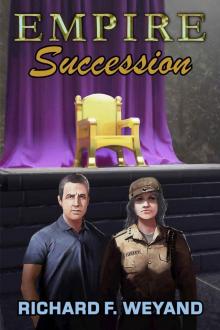 EMPIRE: Succession
EMPIRE: Succession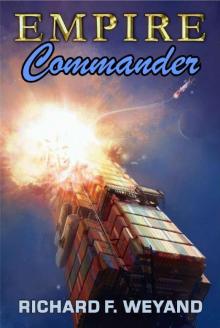 Commander
Commander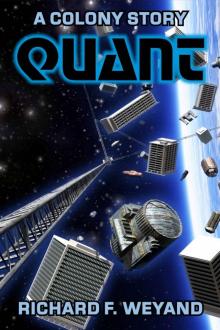 QUANT (COLONY Book 1)
QUANT (COLONY Book 1) EMPIRE: Renewal
EMPIRE: Renewal GALACTIC SURVEY (COLONY Book 3)
GALACTIC SURVEY (COLONY Book 3) Campbell- The Problem With Bliss
Campbell- The Problem With Bliss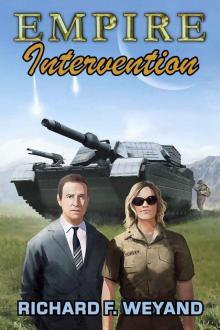 EMPIRE: Intervention (EMPIRE SERIES Book 13)
EMPIRE: Intervention (EMPIRE SERIES Book 13)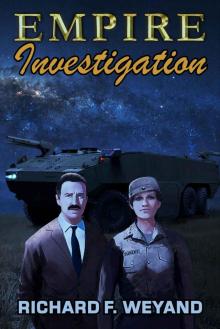 EMPIRE: Investigation
EMPIRE: Investigation A Charter for the Commonwealth
A Charter for the Commonwealth EMPIRE: Resistance
EMPIRE: Resistance EMPIRE: Warlord (EMPIRE SERIES Book 5)
EMPIRE: Warlord (EMPIRE SERIES Book 5) EMPIRE: Resurgence
EMPIRE: Resurgence EMPIRE: Conqueror (EMPIRE SERIES Book 6)
EMPIRE: Conqueror (EMPIRE SERIES Book 6)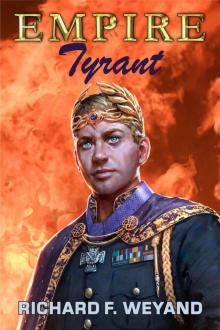 Tyrant
Tyrant Usurper
Usurper Galactic Mail: Revolution! (Childers Universe Book 3)
Galactic Mail: Revolution! (Childers Universe Book 3) Galactic Mail_Revolution!
Galactic Mail_Revolution! Childers
Childers CHILDERS_Absurd Proposals
CHILDERS_Absurd Proposals